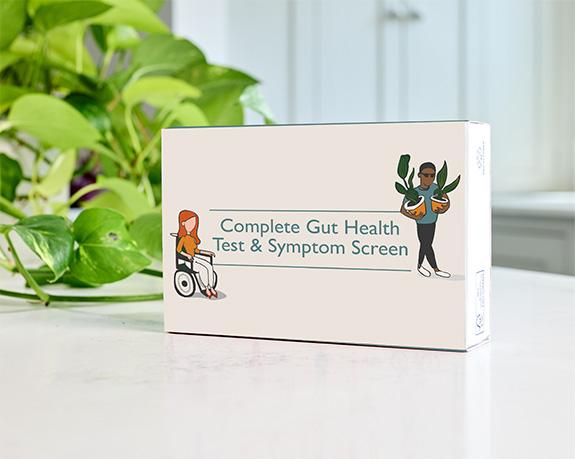Coeliac disease symptoms - do I have coeliac disease?
Published
Key Article Takeaways
- Common coeliac symptoms are: diarrhoea, vomiting, stomach pain, weight loss, bloating, tiredness, floating stools and headaches.
- More subtle signs of coeliac disease include irregular periods, infertility, weak bones, rashes, anaemia and numbness.
- 1-in-3 people with coeliac disease may not notice any symptoms at all.
- Because the coeliac disease symptoms overlap with other gut conditions, it’s important to take a coeliac disease test to see if you might have it.
Coeliac disease is really common, affecting around 1-in-100 people. If you’re wondering, “do I have coeliac disease” then the first place to start is to get to grips with coeliac symptoms and see if any sound familiar. Coeliac disease symptoms can actually vary a lot from person-to-person and some are more common than others. We’ll go through the common and less common coeliac symptoms, explain what they are and even tell you what other gut conditions could be causing them.
What are the commonest symptoms of coeliac disease?
About half of people with coeliac disease will have diarrhoea.
Roughly two thirds of people with coeliac disease will have symptoms1. Most, but not all, of these symptoms relate to the gut. Here are the top coeliac disease symptoms to watch out for.
- Diarrhoea: diarrhoea means going to the toilet more often than usual (for you) and typically having looser stools. About half of people with coeliac disease will have diarrhoea making it the commonest coeliac symptom2.
- Nausea and vomiting: some coeliacs can react very quickly to eating gluten and experience nausea and vomiting. This can almost feel like acute “food poisoning”.
- Stomach ache or pain: coeliac disease causes inflammation in the small bowel which can lead to stomach pain. If you have coeliac disease, you may experience pain in the upper part of the stomach.
- Weight loss: coeliac disease causes malabsorption meaning that your body can struggle to get all the nutrients it needs. Weight loss is a common coeliac symptom and affects about 30% of people. However, it’s worth knowing that you can still be a normal weight or overweight and have coeliac disease.
- Bloating and gas: feeling bloated and gassy can affect us all but it’s particularly common in coeliac disease. Roughly 1-in-3 coeliacs experience this symptom.
- Tiredness and fatigue: tiredness is a common coeliac disease symptom and can be related to the inflammation or to vitamin deficiencies caused by malabsorption.
- Pale, floating stools: coeliac disease can stop your body absorbing fat properly so more fat makes its way into your stools. Because fat is less dense than water, fat in the stools can cause them to float and give them a greasy appearance.
- Headaches and brain fog: the gut and brain are connected so it’s no surprise that coeliac disease can cause neurological symptoms. Headaches are common, as is difficulty concentrating or “brain fog”.
Commonest Symptoms of Coeliac Disease
- Diarrhoea
- Nausea and vomiting
- Stomach ache or pain
- Weight loss
- Bloating and gas
- Tiredness and fatigue
- Pale, floating stools
- Headaches and brain fog
What is silent coeliac disease?
Although two thirds of people with coeliac disease have symptoms, a third of coeliacs don’t complain of symptoms but still show the classic signs of coeliac disease in their bowel. This is so-called “silent” coeliac disease and can be very tricky to pick up without testing.
Although people with silent coeliac disease may not have noticed symptoms, they can certainly still be affected by the effects of coeliac disease including malabsorption, vitamin deficiency, infertility and even lymphoma (a thankfully rare complication of coeliac disease involving a cancer of the blood cells). So although we call it “silent”, it’s probably better to think of silent coeliac disease as “unrecognised” coeliac disease. So what are the rarer, more subtle signs of coeliac disease to think about?
What are the more subtle coeliac disease symptoms and signs?
As we’ve said, not everyone gets the classic, gut-related coeliac symptoms. Here are the more subtle symptoms and signs that might just be coeliac disease.
Even if you’re just suffering with irregular periods it’s worth considering coeliac disease.
- Infertility and irregular periods: coeliac disease is more common in women and many have a history of infertility. In fact, in one study investigating women for infertility, 3% of cases were found to have coeliac disease3. Even if you’re just suffering with irregular periods it’s worth considering coeliac disease.
- Anaemia: coeliac disease commonly causes iron deficiency which can lead to anaemia where you have a low amount of haemoglobin in your blood. Iron deficiency is also common in women because of blood loss during their cycle but it’s important to consider coeliac disease as a potential cause.
- Skin rash: there’s a particular skin rash associated with coeliac disease called “dermatitis herpetiformis”. This symptom affects about 1-in-10 coeliacs and presents with an itchy, blistering rash commonly found on the knees, elbows, buttocks and scalp (see picture below).

- Weak bones: coeliac disease can stop you absorbing calcium and vitamin D properly. These are both essential to bone health and deficiency can cause osteoporosis (low bone density) or osteomalacia (bone softening). You might experience bone pain and suffer with fractures (breaks) more easily.
- Numbness and tingling: sounds strange but numbness and tingling, particular in the arms and legs, can be a symptom of coeliac disease. This may be related to a direct effect of the disease itself on nerve fibres or due to vitamin B12 deficiency. Coeliacs can also experience problems moving the arms, hands, legs and feet.
Subtle coeliac disease symptoms and signs
- Infertility and irregular periods
- Anaemia
- Skin rash
- Weak bones
- Numbness and tingling
What else could my symptoms be caused by?
Now that you know the common and less common symptoms of coeliac disease, I’m sure you can appreciate that many of these symptoms can be seen in other conditions. So let’s go through the key conditions that can be confused with celiac disease.
If you’re over 40 and have had a change in bowel habit or weight loss, you should absolutely check your bowel cancer risk.
- Irritable bowel syndrome: IBS or irritable bowel syndrome can cause many of the same symptoms as coeliac disease including stomach pain, bloating and diarrhoea. It can even be triggered by the same foods such as bread and pasta. Before anyone is diagnosed with IBS, guidelines recommend that they have coeliac disease ruled out because the symptoms are so similar4. Before settling on a diagnosis of irritable bowel syndrome you should take our Essential IBS Screening Test.
- Inflammatory bowel disease: like coeliac disease, IBD or inflammatory bowel disease, affects 1-in-100 people. Common symptoms include stomach pain, diarrhoea and weight loss. You can easily test for gut inflammation with a Calprotectin Gut Inflammation Test.
- H. pylori infection: H. pylori is a common stomach infection that causes inflammation (gastritis) with very similar symptoms to coeliac disease: pain, bloating, nausea and floating stools. Rule out H. pylori infection with an H. pylori stool antigen test.
- Bowel cancer: many people aren't diagnosed with coelaic disease until their 50s and 60s. At this age, we also need to consider bowel cancer which affects around 1-in-15 people. If you’re over 40 and have had a change in bowel habit or weight loss, you should absolutely check your bowel cancer risk with a qFIT Bowel Cancer Screening Test.
Common conditions mistaken for coeliac disease
- Irritable bowel syndrome (IBS)
- Inflammatory bowel disease
- H. pylori infection
- Bowel cancer
Because there’s so much overlap between the symptoms of different bowel conditions it often makes sense to just check for all the common and important conditions in one go. That’s why we’ve put together the Complete Gut Health Test & Symptom Screen which tests for coeliac disease as well as all of the conditions mentioned above.
Still unsure if you have coeliac disease? Order an at home test now.
So if some of these coeliac symptoms sound familiar, what should you do next? To be confident about whether or not you have coeliac disease you need to take a coeliac disease blood test. This is actually a really simple blood test that’s recommended by the NHS and that you can take at home and send off to our lab for analysis. You’ll get a doctor’s report explaining your coeliac disease test results and whether or not you are likely to have coeliac disease.
Get tips on better health
Sign up to our emails on the better way to better health.
We'll keep you up-to-date with the latest research, expert articles and new ways to get more years of better health.







